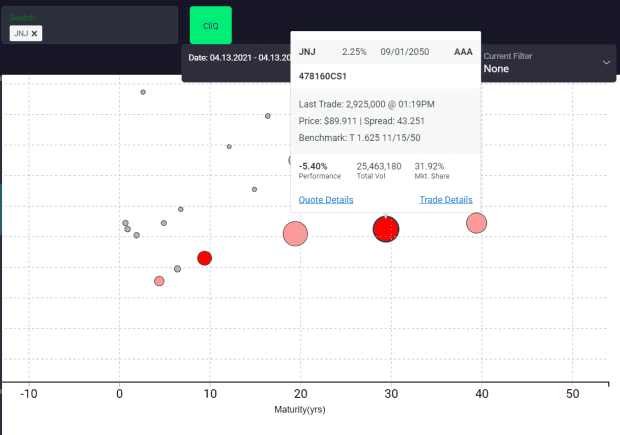This post was originally published on this site
Johnson & Johnson’s corporate bonds were trading lower across the board Tuesday, after two leading U.S. health agencies recommended a pause on its one-shot COVID-19 vaccine after six women who received the shot developed blood clotting.
While selling was more pronounced in JNJ
JNJ,
bonds that mature in 20 to 40 years, downward pressure also was evident in its shorter five-year debt, according to data from BondCliq, a platform that tracks corporate bond trading activity.
This chart shows JNJ’s most active 2.25% bonds due Sept. 2050 were seeing the brunt of the selling, down about 5.4% in afternoon trade Tuesday.

JNJ bonds under pressure
BondCliq
The White House said on Tuesday that the JNJ pause won’t have a significant impact on its vaccination plan, in part because the Biden administration already has enough alternatives doses to vaccinate 300 million Americans.
Read: Johnson & Johnson vaccine pause: What to know if you got or scheduled the shot
“I think it’s probably a touch too early to draw a firm conclusion,” said Brian Kloss, portfolio manager on Brandywine Global, about if the JNJ pause could hamper the broader U.S. COVID-19 vaccination push. “The question we do have to ask, is does this mean something similar for Pfizer or Moderna?”
About 37% of the U.S. population has received at least one dose of a COVID-19 vaccine, according to government data. The White House said less than 5% received the one-shot JNJ vaccine, while the remainder were given two-shot doses developed by Pfizer Inc.
PFE,
and German partner BioNTech SE
BNTX,
or from Moderna Inc.
MRNA,
which received emergency use authorization before Johnson & Johnson.
Food and Drug Administration and Centers for Disease Control and Prevention recommended the pause on JNJ shots Tuesday after six cases of blood clotting were reported in women, all aged between 18 and 48, out of roughly 6.8 million people who have received this vaccine.
A chief worry on Wall Street has been that any delays in getting swaths of the U.S. vaccinated could hamper the economic rebound from the pandemic.
Stocks were mixed Tuesday, with the Dow Jones Industrial Average
DJIA,
off about 0.1%, but still trading just shy of last week’s all-time highs. Shares of the large iShares iBoxx $ Investment Grade Corporate Bond ETF
LQD,
were up 0.4%, according to FactSet.
“Valuations are definitely, on a spread basis, trading toward historical tights,” Kloss said of U.S. investment-grade corporate bonds, which are priced at a premium above risk-free Treasury
TMUBMUSD10Y,
rates. “One could call them ‘rich’ and not offering a significant margin of error.”
On the flip side, any type of hiccup in the so-called reopening trade likely would be met with further support from the Federal Reserve or from Congress in the form of additional stimulus, he said.
“I honestly, don’t think it derails the recovery,” said Patrick Leary, Incapital’s head of trading, of the JNJ pause. “To the extent it causes vaccine hesitancy among people, that’s the worry.”
Johnson & Johnson and Microsoft Corp.
MSFT,
hold the rare distinction of being the only two U.S. corporations left with top AAA ratings, pointing to a low likelihood of default by either company. That also means any spread volatility likely will remain fairly muted.
JNJ said in a statement that is “working closely with medical experts and health authorities.” The company also said it would “proactively delay the rollout of our vaccine in Europe,” following its mid-March authorization for use in the region. There was no immediately response for this article.
The FDA granted J&J emergency authorization use for its one-shot COVID-19 vaccine on Feb. 27.
Read: Here’s why the bond market shrugged off a surge in U.S. inflation

